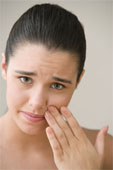September 14th, 2011 by Shadowfax in Health Policy, News
1 Comment »

This is depressing:
A 24-year-old Cincinnati father died from a tooth infection this week because he couldn’t afford his medication, offering a sobering reminder of the importance of oral health and the number of people without access to dental or health care.
According to NBC affiliate WLWT, Kyle Willis’ wisdom tooth started hurting two weeks ago. When dentists told him it needed to be pulled, he decided to forgo the procedure, because he was unemployed and had no health insurance.
When his face started swelling and his head began to ache, Willis went to the emergency room, where he received prescriptions for antibiotics and pain medications. Willis couldn’t afford both, so he chose the pain medications.
The tooth infection spread, causing his brain to swell. He died Tuesday.
It can’t be denied that his poor decision-making was the proximate cause of this guy’s death (and many times I’ve gotten the maddening call from the pharmacy, “Doctor, the patient only wants the narcotics”). The underlying cause, however, was the fact that he was uninsured. Read more »
*This blog post was originally published at Movin' Meat*
September 6th, 2010 by Toni Brayer, M.D. in Better Health Network, Health Tips
No Comments »

 Canker sores are painful, and mouth pain cannot be ignored. They’re difficult to prevent and you just have to cope with them until they go away. We have no idea what causes them. For a doctor, this is difficult to accept. What the heck are canker sores?
Canker sores are painful, and mouth pain cannot be ignored. They’re difficult to prevent and you just have to cope with them until they go away. We have no idea what causes them. For a doctor, this is difficult to accept. What the heck are canker sores?
The medical term is apthous ulcers and they’re round or oval painful ulcers that appear on the tongue, inner lips, inside of cheeks, or palate of the mouth. Up to 40 percent of people have experienced canker sores. So why have the remaining 60 percent never had them? We don’t know. Read more »
*This blog post was originally published at EverythingHealth*
September 5th, 2010 by Medgadget in Better Health Network, News, Research
No Comments »

 Researchers at the University of Saskatchewan have developed a solar-powered toothbrush that doesn’t require toothpaste.
Researchers at the University of Saskatchewan have developed a solar-powered toothbrush that doesn’t require toothpaste.
At the base of the brush is a solar panel, which transmits electrons to the top of the toothbrush through a lead wire. These electrons react with acid in the mouth, breaking down plaque without the help of toothpaste. It’s an advancement of a model described 15 years ago using a titanium dioxide rod which released electrons when illuminated.
The researchers are currently recruiting 120 teens to test the brush. The model is named Soladey-J3X and is manufactured by the Shiken company of Japan.
More from Saskatoon StarPhoenix: Solar toothbrush could make toothpaste obsolete…
*This blog post was originally published at Medgadget*
July 8th, 2010 by Medgadget in Better Health Network, News, Research
No Comments »

 Although people are generally proud of their dental hygiene, undoubtedly many have had root canals that have been plugged using traditional fillings. The procedure is far from being everyone’s favorite pasttime, as only true masochists can enjoy having high speed drills working their teeth and hot glue guns filling them.
Although people are generally proud of their dental hygiene, undoubtedly many have had root canals that have been plugged using traditional fillings. The procedure is far from being everyone’s favorite pasttime, as only true masochists can enjoy having high speed drills working their teeth and hot glue guns filling them.
A team of French researchers has been working on a new approach that uses nanostructured and functionalized multilayered films to help regenerate teeth and fill in cavities with little pain but all the gain. Read more »
*This blog post was originally published at Medgadget*
May 28th, 2010 by Toni Brayer, M.D. in Better Health Network, Health Tips, Research
No Comments »

 The British Medical Journal reported on a study of toothbrushing and found that people with poor oral hygiene had an increased risk of cardiovascular disease and heart attack.
The British Medical Journal reported on a study of toothbrushing and found that people with poor oral hygiene had an increased risk of cardiovascular disease and heart attack.
We’ve known for the last two decades that inflammation plays an important role in atherosclerosis. Markers of low-grade inflammation like C-reactive protein are also shown to be higher in heart disease.
The Scottish Health researchers looked at the general population and followed a large subset with questions about their oral health. They asked about frequency of dentist visits, toothbrushing, and controlled for many co-variables such as general activity, hypertension, smoking, height and weight. They also collected blood for studies of C-reactive protein as a marker of inflammation. They removed from the analysis participants who had no natural teeth (edentulous) and those with existing cardiovascular disease.
This elaborate and lengthy study showed that toothbrushing is associated with cardiovascular disease, and that subjects who brushed their teeth less than once a day had a 70 percent increase in heart disease compared with people who brushed twice a day. The inflammation that periodontal disease causes is directly related to increased C-reactive protein and increased heart attacks.
Leave it to the Scotts and the Brits to remind us to brush and floss every day.
REFERENCE: British Medical Journal, 2010; 340: c2451.
*This blog post was originally published at EverythingHealth*




 Canker sores are painful, and mouth pain cannot be ignored. They’re difficult to prevent and you just have to cope with them until they go away. We have no idea what causes them. For a doctor, this is difficult to accept. What the heck are canker sores?
Canker sores are painful, and mouth pain cannot be ignored. They’re difficult to prevent and you just have to cope with them until they go away. We have no idea what causes them. For a doctor, this is difficult to accept. What the heck are canker sores?
 Researchers at the University of Saskatchewan have developed a solar-powered toothbrush that doesn’t require toothpaste.
Researchers at the University of Saskatchewan have developed a solar-powered toothbrush that doesn’t require toothpaste. Although people are generally proud of their dental hygiene, undoubtedly many have had root canals that have been plugged using traditional fillings. The procedure is far from being everyone’s favorite pasttime, as only true masochists can enjoy having high speed drills working their teeth and hot glue guns filling them.
Although people are generally proud of their dental hygiene, undoubtedly many have had root canals that have been plugged using traditional fillings. The procedure is far from being everyone’s favorite pasttime, as only true masochists can enjoy having high speed drills working their teeth and hot glue guns filling them. The British Medical Journal reported on a study of toothbrushing and found that people with poor oral hygiene had an increased risk of cardiovascular disease and heart attack.
The British Medical Journal reported on a study of toothbrushing and found that people with poor oral hygiene had an increased risk of cardiovascular disease and heart attack.







